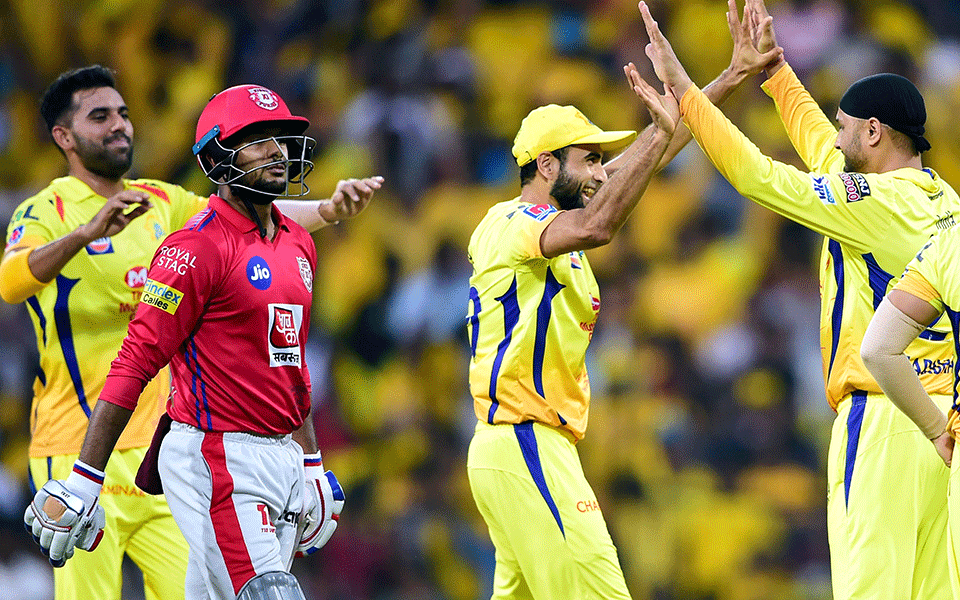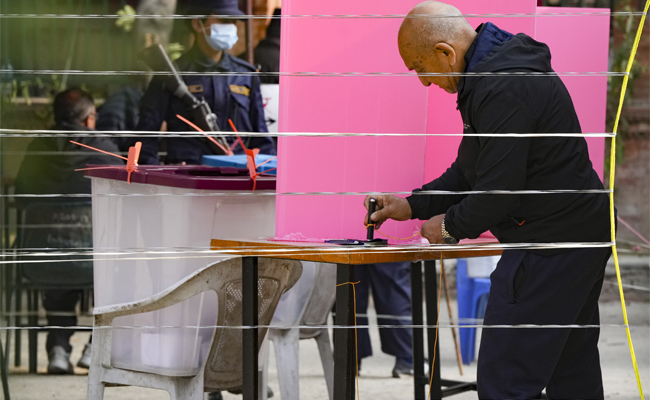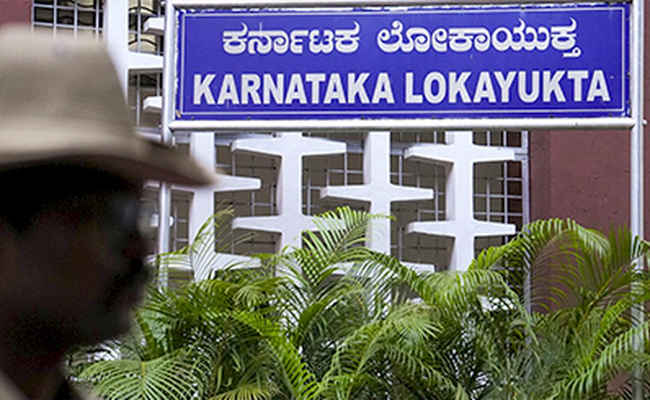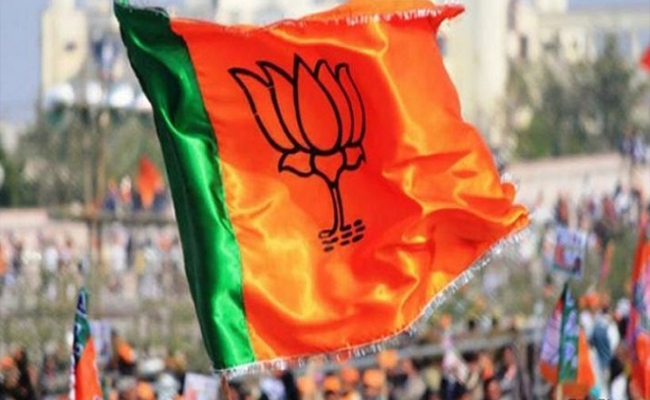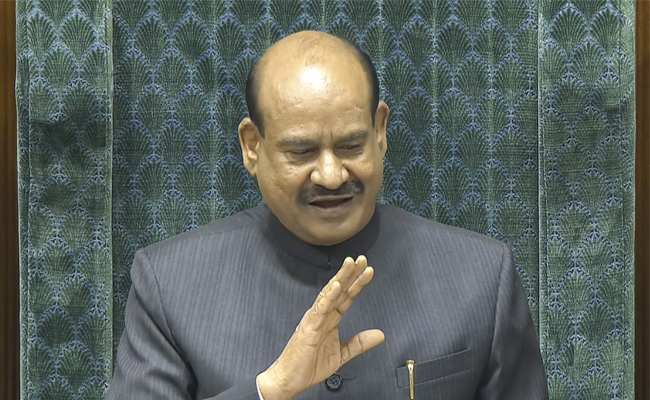Chennai, Apr 6: Led by seasoned Harbhajan Singh, Chennai Super Kings spinners put on a dominating show to help the side reclaim the top position with a 22-run win over Kings XI Punjab in an IPL match, here Saturday.
Defending 160 for three, CSK restricted Punjab to 138 for 5 despite half centuries from K L Rahul (55) and Sarfaraz Khan (67).
The visitors scored at a low pace and required to score 26 off the last over, bowled by IPL debutant Scott Kuggeleijn. The Kiwi paceman had no trouble defending those runs and also dismissed Sarfaraz.
Harbhajan was the best bowler for the hosts with the figures of 4-1-17-2. In a brilliant spell, he bowled a maiden and grabbed two wickets, including that of the 'universal boss' Chris Gayle.
Ravindra Jadeja (4-0-24-0) and Imran Tahir (4-0-20-0) also helped CSK put the brakes on the rival batsmen. They, along with Harbhajan, conceded only 61 runs in 12 overs even as the required run-rate kept mounting.
Kuggeleijn did not start very well, being hit for a six off his very first ball, but did well to finish with 2 for 37 in his 4 overs.
Harbhajan struck a huge blow to rivals by dismissing the Gayle, having him caught behind by M S Dhoni for 5 in the second over.
Two balls later, he had the stylish Mayank Agarwal, caught by Faf du Plessis near the boundary with the batsman going for a big hit. Harbhajan started off with a double wicket maiden to put Kings XI on the backfoot early.
In the 13th over, Rahul's missed sweep saw Dhoni flick the ball on to the stumps but the bails didn't come off though the LED lights lit up, ensuring the batsman survived despite being short of his crease.
The century partnership for the third wicket between Rahul and Sarfaraz was a productive one but they consumed a lot of balls and stymied the Kings XI chase as the CSK bowlers kept things tight.
Earlier, du Plessis hit a fine half-century up the order while skipper Dhoni and Ambati Rayudu provided the late flourish to help Chennai Super Kings post a competitive 160 for three.
Du Plessis made 54 off 38 balls with the help of two fours and four hits over the fence and together with Shane Watson (26) added 56 runs for the first wicket after opting to bat.
But it was some late hitting by Dhoni (37 not out) and Rayudu (21 not out) and their unbeaten 60-run fourth wicket partnership in 30 balls helped the defending champions reach a respectable total.
Thanks to Dhoni and Rayudu, CSK scored 52 runs in the last five overs after a rather quiet middle period.
Kings XI skipper Ravichandran Ashwin was the best bowler for the visitors, picking up three wickets for 23 runs from his four overs. He was on a hat-trick in the 14th over after getting half-centurion Du Plessis and Suresh Raina off successive deliveries.
Watson fell against the run of play, attempting a big shot off Kings XI captain Ashwin to be well caught by Sam Curran in the deep.
Raina (17), who came in at No.3, strung together an useful 44-run partnership with Du Plessis, who kept the scoreboard ticking with a mix of attacking shots and judicious running between the wickets.
The partnership was broken when Du Plessis perished while going for a big hit off Ashwin, caught at long-on by David Miller and then a ball later the off-spinner cleaned up Raina as the batsman went for a sweep.
Let the Truth be known. If you read VB and like VB, please be a VB Supporter and Help us deliver the Truth to one and all.
Kathmandu (PTI): Nepal which went to polls on Thursday, the first since a violent Gen Z protest that toppled the K P Sharma Oli-led government last year, recorded a turnout of about 10.18 per cent till 11 am, according to the Election Commission.
The Election Commission said that around 1.93 million people have exercised their franchise till 11 am.
Earlier, the commission had said around six per cent of eligible voters had cast their ballots by 9.30 am.
More than 18.9 million eligible Nepalese will be exercising their franchise to elect the 275-member House of Representatives from among the 3,406 candidates vying for 165 seats under direct voting, and 3,135 candidates vying for 110 seats through proportionate voting.
ALSO READ: More than 1,200 booked for drunk driving during Holi celebrations in Delhi
The voting started at 7 am and will conclude at 5 pm. The counting will start immediately after the ballot boxes are collected.
Voting is ongoing smoothly across the country with minor incidents in a very few places, Election Commissioner Sagun Shumsher Rana was quoted as saying by the Kathmandu Post.
Nepal Police confirmed that apart from minor disagreements at a few locations, no serious problems had occurred.
Police spokesperson Abi Narayan Kafle said, “Some jostling is expected during elections, but no major issues have arisen. We are ensuring that the voting process remains peaceful throughout the day.”
"Voting started in all the constituencies, including the southern plains, hilly area and the mountain region at 7 am," Election Commission spokesperson Narayan Prasad Bhattarai said.
“The election started in a peaceful environment across the country,” he added.
Addressing a press meet here on the eve of the polls, Acting Election Commissioner Ram Prasad Bhandari on Wednesday had said that all preparations for the election had been completed and urged voters to participate actively and enthusiastically in the democratic exercise.
In Kathmandu, the weather was fine, sky was clear and people were enthusiastically queuing up to cast their votes.
Interim Prime Minister Sushila Karki cast her vote from Kathmandu-5 constituency at Dhapasi on the outskirts of Kathmandu on Thursday morning.
"I have cast my vote, I am happy that people are casting their votes, participating in the general election," she said.
Nepali Congress president Gagan Thapa cast his vote from Kathmandu-4 constituency in Maitidevi in the morning.
"This election was needed to bring the Constitution back on the right track," he said.
Thapa, the prime ministerial candidate of Nepali Congress, is contesting the election from Dhanusha-4 constituency.
Rastriya Swotantra Party (RSP) president Ravi Lamichhane cast his vote from Chuchepati area on the outskirts of Kathmandu.
Prime ministerial candidate of RSP and former Kathmandu mayor Balendra Shah ‘Balen’ cast his vote from Gairegaun, Kathmandu. He is contesting the election from Jhapa-5.
The Gen Z youth, through their two-day intensified protests on September 8 and 9, ousted Prime Minister Oli, chair of the Communist Party of Nepal (Unified Marxist–Leninist) -- CPN-UML -- who was heading a coalition government with the backing of Nepali Congress that enjoyed nearly two-thirds majority support.
The CPN-UML, led by ousted PM Oli, has emerged as the hardliner force. Though former premier Pushpa Kamal Dahal 'Prachanda'-led NCP claims to have addressed the issues raised by the Gen Z, they have not handed over the party leadership to the younger generation.
Rastriya Swotantra Party (RSP), led by its chair Ravi Lamichhane and senior leader Balendra Shah, and the reformed Nepali Congress, led by Gagan Thapa, are voicing the issues raised by the Gen Z, while CPN-UML and Nepali Communist Party, led by ‘Prachanda’, are known as the traditional forces.
Ujyalo Nepal Party, led by Kulman Ghising, and Shram Shakti Party, led by former Dharan Mayor Harka Sampang, are also emerging forces but enjoy support in limited pockets only.
After Oli's ouster, President Ramchandra Paudel dissolved the House of Representatives on September 12 and appointed Sushila Karki as the caretaker PM.
The major issues raised by Gen Z are anti-corruption, good governance, an end to nepotism, generational change in political leadership, etc.
Starting Wednesday, Nepal has declared a three-day holiday for the polls.
There are a total of 10,967 polling booths and 23,112 polling centres, the Election Commission data showed. As many as 65 political parties are taking part in the election.

